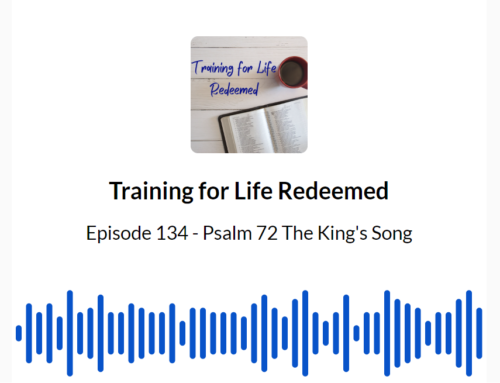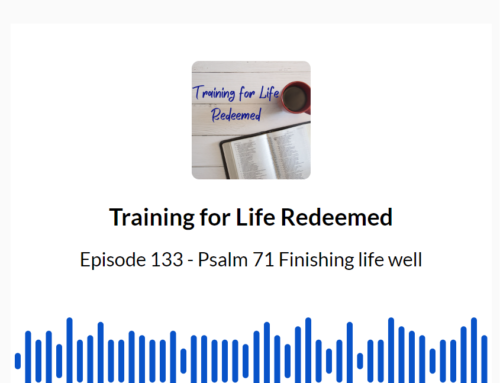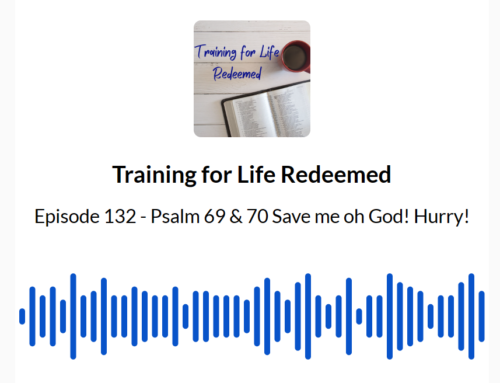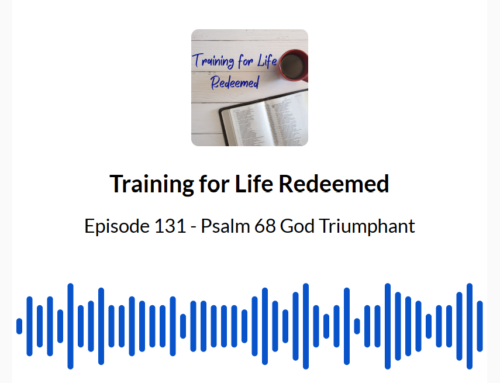Grab your notes for this episode by completing the form
and we will send you the link to all our notes.
God issues the call and keeps his commitment to forgive, restore, and renew because he came and was executed in the place of Sinners. Answering that call involves admission and appreciation of guilt a commitment to be faithful to him, abandoning ourselves to his grace trusting his word.
Hi everyone and welcome to trainingforliferedeemed. I’m Dan I’m chatting with my father, Dr David Jackson. And we I continue to work our way through the book of Psalms. We’re currently halfway through. A little four grouping of the psalms. We’re looking at psalms 49, 50, 51, and 52. So we’re just about to start at 51 today.
The last, the first two were kind of a call to the nations to kind of you know understand that their way of thinking is going to end up with them dead and nothing else happening And they’re just, you know, they’re lost and they need to be redeemed from Sheol and that whole thing that happened there. And then the second one was about. God. A similar thing with the actual people of Israel and saying those who were faithful, You’re not to worry about those who are not going to tear you your apart like dogs tear people apart when they catch them. Like wild dogs you know It’s not like cute little fluffy things that we have today…
This one Dad, we’re hitting Psalm 51. It’s a very well-known Psalm. Yep.
02.01 David
Psalm 51
0 For the director. A composition of David.
When Nathan the prophet came to him because he came into Bathsheba.
The Plea
1 Be gracious to me, God,
according to your covenant faithfulness.
According to your great compassion,
blot out my rebellions.
2 Many!
Wash me from my guilt,
and purify me from my sin.
The Admission
3 For I know my rebellions,
and my sin is constantly in front of me.
4 Against you, against you only I sinned,
and I did the rotten thing in front of your eyes,
So that you are just in your word;
You are pure in your judging.
The Condition
5 Behold I was born in guilt,
and my mother conceived me in sin.
6 Behold you delight in truth in one’s inner person,
And you cause me to know by plugging up wisdom.
7 You de-sinned me with hyssop, and I am cleansed.
You wash me and I am whiter than snow.
8 You cause me to hear celebration and happiness,
and the bones you crushed rejoice.
The Plea
9 Hide your face from my sins,
and blot out all my guilt.
10 Create for me a clean heart, God,
and renew a firm resolve within me.
11 Do not throw me out from your presence,
and do not take your Holy Spirit from me.
12 Restore to me celebration of your salvation,
and you will sustain a willing attitude for me.
The Promise
13 I will teach rebels your ways,
and sinners will return to you.
14 Deliver me from bloodshed, God,
God of my salvation.
My tongue will ring out your righteousness.
15 My Lord you will open my lips,
And my mouth will tell your praises.
16 For you do not delight in sacrifice,
or I would give it.
A whole burnt offering is not pleasing.
17 Sacrifices of God are a broken spirit,
God you will not despise a broken, crushed heart.
A Plea for the People
18 Do good in your kindness to Zion.
Build the walls of Jerusalem.
19 Then you will delight in sacrifices of righteousness,
A whole burnt offering,
Then steers will go up on your altar.
03.56 Dan
So, it is composed by David. Nathan the prophet came and told him off after raping Bathsheba. So I think it’s slightly in the context of this Psalm is interesting that we have such a repentant Psalm. In connection with 1) a massive scene. Like it’s not just that he had sex with someone who was married. It’s that he’s the king at home by himself, as a man in all the power. And he calls the woman to her and rapes her basically, not basically but he does. Yup and then he covers it all up. To try and get the guy. And then murders the husband and then takes her as his extra concubine into the palace…
There’s a lot that goes on here. He didn’t freely come to God and say, I stuffed up big time. So like he’s reflecting and goes, yeah, probably shouldn’t have done that…
He’s called to account by prophet. And it’s you know with the curses essentially that he gets given that he’s like, ah I should repent. At least that’s how it feels when you look at it. But then the psalm he writes is amazing.
Yeah. But it starts off in this terrible context. Did I miss anything about the context? I think…
05.16 David
When we talk about sin, sin is a religious word: transgression, all those iniquity. That’s all religious language. When you go into the street and you listen to people talk about wrongdoing and so forth, “I made a mistake.” All that sort of language. Nothing is ever the horror of guilt. And so we live in this cover-up/ denial existence. And I think this psalm, and Psalm 32 is one that goes with it, helps us to understand the reality of guilt and shame. That it is real.
And we seem to have a culture that wants to throw every psychologist and therapy. And everybody’s got to go to the counsellor to deal with the guilt and shame, as if guilt and shame was some artificial thing that accidentally got stuck on us. We got. And we fell in the mud and now we’ve got to wash it off. But we didn’t do anything wrong.
One of the great discoveries I mean we’ve just had Anzac day. One of the great discoveries of the last probably only 20 years, is that. you know we’ve worked our way from shell shock to battle fatigue or whatever label you want to call it. We come out with Post-Traumatic Stress Disorder. So everything’s got to have five nouns in a row and make it sound like it’s really medical and scientific.
But my dear friend Grant Dibden, who is the Anglican Bishop to the armed forces: a 20 year regular soldier, Colonel in the supply Corps. When he presents a paper to the chaplains for how we deal with returning veterans he talks about moral moral injury.
And so we have this fantasy that all of our soldiers went off to war and they saw bad things happen. And so they come home traumatized by what they saw. And what Grant is, and a number of people now, are recognizing is not only what they saw but what they did.
It is unnatural. It is contrary to who we are, to kill another human being. Let alone to do it in the ways that the military do. To do it, to see the end result, puts you in a state of PTSD. And who do you talk to about that? Who would understand? And who could wash you clean from what you’ve done?
That’s the. That’s what we’re finding here. David is living in this fantasy land. He’s the king at home. He’s. I heard somebody recently talk about David inviting Bath Sheba over…
Yeah So I think a lot of evangelicals… a gentle invite? It was Yeah. A lot of evangelicals have got the idea that this was a consensual sexual encounter that got out of hand.
We used to do a workshop with year nine on this. Because it was really important thing to do. Where we said to the. We handed out little voting slips. And we said to them, blind vote, “Was she raped or did she consent?”
Two-thirds of the guys said she consented. All the girls said she was raped. So then we brought it all in and we counted the votes and we put it up on the board. And the kids, I mean, they’re not just kids. These are 15-year-old, 16-year-olds. They’re looking at each other going right.
And I said all right ladies explain to the boys, why you believe this was rape. And that was the most. brilliant conversation. Because the guys got it. She’s over there on her own. Her husband’s away at war. She’s alone. You’ve got this pervert king looking over the wall at her. And then he doesn’t invite her over. He sends an armed guard to take her. And he beds her and sends her home, and that’s that. Hmm…
And it wouldn’t matter if she screamed the house down. No one else is there to hear her. No one’s going to hear it and the armed guards are just going to hold her down. I mean, this is ridiculous. It’s rape. So David has committed rape. And then he’s arranged to have one of his most loyal and bravest warriors killed on the battlefield by his own commanding officer.
He’s cruising in this fantasy land where this is somehow Okay. And God won’t notice. Or what planet was he on.
And then Nathan is – you’ve got to feel for the prophet. That night the prophet comes to him and he can’t just outright say you did a bad thing. You know, The king would dong him on the head. So he tells him this lovely story and he gets David all upset about somebody who stole a silly sheep. And it’s “you are the man.”
And when David gets it he is devastated. It’s that devastation/ shame. You know I want to drop through the floor. I have. I can’t cope with the guilt. We begin to get a picture of that here.
One of my concerns with this psalm Is the way I read that song 3000 years later. And I’ll get back to this idea. I think in many of these songs where David talks about, you know, an incident in his life I think we imagine that we’re watching a musical on stage.
11.47 Daniel
He burst into song halfway through. Nathan came in. Nathan walked out. He’s down on his knees singing an opera or something.
11.56 David
And it turns it into some sort of, I dunno, fantasy. This is blood and guts stuff. How do you take a man who raped your sister, murdered her husband, and see God do grace to him.
And how does the man himself ever face anybody. Let alone when you know that he is God’s child. Messiah. Messiah. He is a king who is a man after God’s own. This is the best Israel’s got. And he’s a monster.
So, what makes David great out of this song, out of this whole incident is the fact that he is smashed by his guilt. And he gets on his face. And so this song was written, not for David.
But he has come out of this, out of his shame and his guilt and the horror of the whole thing. Mind you in the process the baby died. You know this is this is not without great cost. And he. He writes this for me.
He writes this for us. So that we would understand what it is to tell God to go jump in the lake and do our own anything. And the damage that it does. So. it is. It’s a song written to teach. And to be an exemplar. Of what we’re supposed to do
13.45 Dan
Now…David in this Psalm. Has a line in there that people get pretty offended by quite a lot, when he talks about (it must be true) verse 4 when David says that he’s only sinned against God.
14.04 David
And that yeah. So he’s he’s not writing that about David. That’s part of my point. He is not writing that about what he did. He’s writing that for you and me to use when we sin. So this isn’t a musical. He’s not writing this,. You know you’re not there on stage on his knees. Singing the aria. You know, against you, and there’s Bath Sheba in the background with the dead baby. You know, That’s not what’s happening. This is David after the whole thing is resolved, after he’s forgiven, showing us how we should respond to our own guilt.
And our response is, whatever the sin, whatever, whoever else we’ve damaged, ultimately, it’s only God. Hmm. If there was no God, none of this would be sin.
14.52 Dan
Yeah. I think for me too as part of the perspective of the fact that everything has God’s creation. Yeah. And so even if I sin against another part of God’s creation, ultimately the sin is against God.
Yeah. You can’t really sin against other people necessarily. I could hurt other people that offend them and we can do damage. Yeah.
And we might use the language of they sinned against me, but it’s, it’s not a good use of language because you really only sin against God.
15.20 David
And that’s that’s the point. If God isn’t there. If we’re not sinning against God there really is no sin. And it’s just survival of the fittest. And that’s as he describes in the previous psalm, that’s an horrendous option. You don’t want to be a beast an idiot.
You know die, cease to exist and tear everybody apart. This is the difference.
15.45 Dan
Yeah And then when we continue through the psalm, the next bit that came was up in conversations when I was teaching it with students, being born, well then you’ve got born into in guilt, or born in sin, or sinful from my birth or lots of ways I’ve seen it written. Yeah.
people get upset about that too. How can a baby be sinful?
The way you’ve got it here I can always interpret it that they were born into guilt Not that they were actually yeah, sinful themselves But. Yeah.
16.18 David
We’ve got to grasp this idea. When Adam sinned he introduced death. And death is a process. He chose rottenness/evil. Evil is damage/destruction/rottenness. He chose that over the beauty of God’s good design. Now the next, when when that happened his body started to fall apart. The child that is born out of his body is born with that damage , and that damage has its root in his sin.
So when we look at a baby being born, we can look at… I’ve just been watching the news with the Folger case where the lady had four children that all died in infancy. And they’ve jailed her for 20 years thinking she murdered the kids. Medical research now comes up with DNA stuff that says each of the four children were born with a physical damage that produced the four deaths. And there were three different variations on their DNA that did that. All of which were something they were born with. They didn’t choose to do. They inherit it. That’s what what happens to us.
Adam told God to go jump in the lake. That meant that he then lives his life as an enemy of God. And everybody born of him is born…
It’s like being a child born in Berlin in 1940. No? The adults are all over there bombing London and the British are sending, and the Americans are sending their bombers over to bomb your house. It wasn’t your choice. But…you’re born into this mess. And that’s what David’s saying. You know I’m born into this mess.
I was born into being an enemy of God. Which I think is interesting. Because he’s born a citizen of Israel. So even though he’s a child of the covenant he’s born an enemy of God. Yeah. Guilty. Sinful. He’s damaged. And he’s crying out to have it fixed. That’s the good thing. I think.
18.47 Dan
Yeah And then if we go through that little section that you’ve translated just cause we like to talk about your actual translations here. the language is fun Yeah You’ve got to be plugged up with wisdom.
No no no no…
19.00 David
Because in verse six you caused me to know. By plugging up wisdom. That’s a really weird expression. Yeah And English translations have all sorts of fun with it. What you’ve got there is somebody who you caused me to know. And we’re hanging onto that knowledge, because you’ve plugged it up where the wisdom is just leaking out. And that just describes people, doesn’t it? You know we get the truth. We get the basic idea. And then the next thing you know, three weeks later, you’ve forgotten all about it. It just all leaked out and you’ve got on with life.
You plugged that up so that I would keep the lesson learned. Hmm I think that’s a beautiful picture.
19.47 Dan
Yeah. And you follow that with. David being, or us if we’re singing it, that God has de-sinned us. That’s the Hebrew word. We’re de-sinned.
I think it’s “delete.” God. Yeah. Yeah.
20.05 David
It’s it’s an amazing picture. I’m looking at it. The language there is brilliant…
You de-sinned me with hyssop I’m cleansed. You washed me. I’m whiter than snow. You caused me to have celebration and happiness. and the bones you crushed rejoice.
You know I’m washed I’m de-sinned and my guilt is gone How many different ways. You know,
20.31 Dan
It goes on There’s lots of ways that he said it in this psalm. I’ve seen so many songs. Yeah.
20.37 David
So when we come to the New Testament and we evangelicals talk a bit you know I’m just. I want to make an excuse for the fact that I do that I stuff up or I make mistakes Right? You. I accidentally fell on that woman and raped her. yeah. It’s ridiculous.
And that’s how we treat our sin. And then we turn around and say well the reason I sinned is because I’m a sinner. I was born this way. I can’t help it. God’s just got to put up with it. And he’s just, well actually, no.
Jesus died in my place. He took all of my punishment for all of my sin instead of me. That’s not going to happen on him and then on me.
And then he sends to me the Holy Spirit, gives me a new heart, new nature, new character. I’m not a sinner any more. That’s not who I am. It might be what I do. But it’s not who I am. Because God has taken all of that away. So I’m a Saint, not a sinner. He declares that I’m blameless, I am righteous, and I’m holy. I’m sanctified. All of that is past tense in the New Testament. It’s also a process where I learn to live out who I am in Christ. The process is a bit more complicated, a bit more difficult. But the gospel is, I am washed. I’m cleansed. I’m de-sinned, which means I have no excuse when I sin.
It’s not because of my nature. It’s because I’m an idiot. Or I’ve been acting like an idiot. I’m doing the stupid thing again. It’s a habit.
So, this is a beautiful part of the song. Yeah. Yeah.
22.28 Dan
Dad, as we keep going through this psalm, there’s lots of spots here, classic bits,…hide your face from my sin, blot out my iniquities. Blah blah blah. It’s throughout It’s very strong. If you don’t know the Psalm. Just if you’ve heard any Christian songs you’ve probably heard parts of it Yeah…
He then gets to the point of the matter when he starts to talk more about in verse 17 how God doesn’t want, doesn’t desire sacrifices, mostly because he’s already got that ultimate one coming. Yeah At this time come already for us. Instead what he’s after is someone who actually is broken. Who is crushed. And it’s really someone who understands the gravity of their sin Yeah.
23.15 David
Yeah, you can’t…
There’s a little line in Luke where Jesus says “he who is forgiven little, loves little.” If you don’t appreciate. The sin You don’t appreciate the grace. And I think that there’s an element where you’ve got to, You’ve got to stand at the cross and look at that bloody, naked body, nailed up there, screaming for you to get the idea that what you did is really serious. Hmm. And get out of this bubble of, you know, making everything nice. This is horrendous. The grace is horrendous. That God would do that to pay for it. So that you don’t…
So, what God is looking for is for you to appreciate that. Hmm. And I don’t think we do. I’m not even sure we can.
But to appreciate at what cost, and therefore what offense we delivered to put those two things together.
So we don’t grow. We don’t… this new nature doesn’t flourish. At first we don’t. Kill the old one. And it dies.
Under that shame and guilt that we then took and delivered to Jesus and when we hand that over then we get the new growth but if we’re trying to live with guilt and muddle along it’s not working. I think there’s an element there where we’ve got to say God is looking down and saying, you really are an ungrateful mob.
You know, it’s something that parents often say to their kids. It is, and there’s my heavenly father. You know, God took flesh came down and went through all of that to pay for the stuff that I think was a mistake. Boy, have I got it wrong. So we’ve got to get back to this. And if we’ve ever experienced that, wee don’t need a counsellor to rescue us from it. We need to go through it. And hand it over. And that’s the process.
25.40 Dan
Dad, that brings us to the end of this episode. If you would like to get the study notes for this episode please head over to trainingforliferedeemed.com/107, hit the subscribe button come back and join us again next week. We’re going to do Psalm 52, looking at what happens to Doeg the Edomite. Talk about a contrast with this kind of repentance. We’ll see you there…



